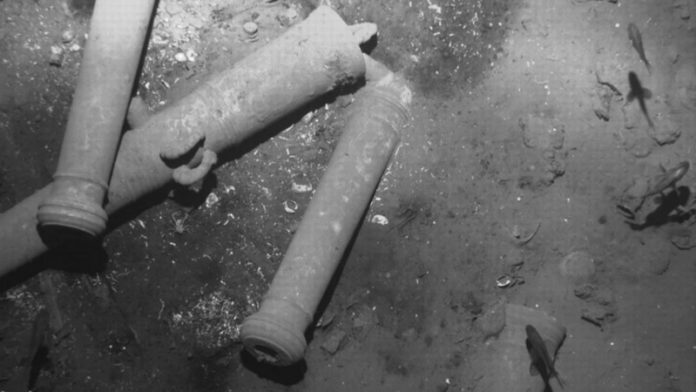Colombia has launched the initial phase of an underwater expedition to explore a Spanish warship that sank in the Caribbean more than 300 years ago and is believed to contain billions of dollars worth of artefacts – the rights to which are under heated dispute.
Discovered in 2015 in waters off the coast of the port city of Cartegena by the Colombian government, the San José is often called the “holy grail of shipwrecks.”
The 62-gun, three-masted ship – the flagship and largest galleon of a Spanish fleet – was believed to have been carrying gold, silver, emeralds and other valuable goods from the mines of Potosi, Peru.
It was said to have been travelling from Panama to Colombia when it sank with 600 people reportedly on board on June 8, 1708, during a battle with British ships in the War of the Spanish Succession.
The first stage of the expedition will focus on photographing the ship using “non-intrusive” remote sensors, the Colombian Institute of Anthropology and History (ICANH) said, adding that results of the initial expedition could pave the way for subsequent explorations, which would include recovering archaeological materials from the shipwreck.
The images will then be used to build an inventory of the archaeological discoveries on the seabed.
ICANH has also declared the discovery site a national “protected archaeological area” to “preserve its scientific and archaeological value.”
Researchers say they also plan to use an underwater vessel with acoustic positioning technologies, as well as a remote operation vehicle with various sensors and tools that can descend to the depth of the site.
“This government is doing something that is unprecedented… exploring the sinking of the galleon as the possibility of understanding history and culture,” Culture Minister Juan David Correa told a news conference in Cartagena on Wednesday, where the expedition was also launched.
Billion dollar legal battle over rights
The San José’s discovery has been significant for Colombia because of the ship’s treasure of cultural and historical artefacts – and clues they may provide about Europe’s economic, social and political climate during the early 18th century.
But it has also sparked a multi-billion dollar legal battle.
Colombia maintains that it first discovered the San José in 2015 with help from international scientists.
But their claims have been disputed by a US-based marine salvaging company named Sea Search-Armada (SSA), formerly known as Glocca Morra, which argues that they were the ones who had discovered the shipwreck in the early 1980s.
SSA has launched a legal battle against the Colombian government in the Permanent Court of Arbitration, claiming it is entitled to approximately $10 billion – half the estimated value of the shipwreck’s treasure.
The Colombian government disputes SSA’s claims.
The loss of the San José and its cargo was said to have caused financial hardships to merchants throughout Europe and the New World, according to reports released by SSA.

